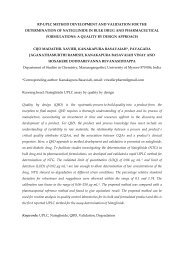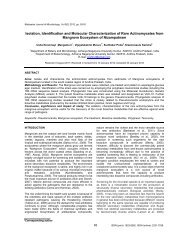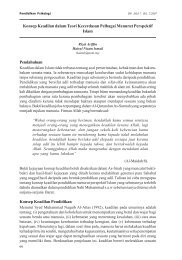"Acceptability" in the Translation into Malay of Rihlat Ibn ... - USM
"Acceptability" in the Translation into Malay of Rihlat Ibn ... - USM
"Acceptability" in the Translation into Malay of Rihlat Ibn ... - USM
Create successful ePaper yourself
Turn your PDF publications into a flip-book with our unique Google optimized e-Paper software.
vi. Équivalence<br />
"Acceptability" <strong>in</strong> <strong>the</strong> <strong>Translation</strong> <strong>of</strong> <strong>Rihlat</strong> <strong>Ibn</strong> Battutah 9<br />
V<strong>in</strong>ay and Darbelnet (p. 38) refer to équivalence 1 as <strong>the</strong> process<br />
<strong>of</strong> render<strong>in</strong>g ST elements <strong>in</strong>to TT by us<strong>in</strong>g completely different<br />
stylistic and structural methods. One example <strong>of</strong> this method is<br />
<strong>the</strong> translation <strong>of</strong> <strong>the</strong> French response to pa<strong>in</strong> Aïe! <strong>in</strong>to English<br />
"Ouch!".<br />
vii. Adaptation<br />
V<strong>in</strong>ay and Darbelnet (p. 39) consider adaptation to be <strong>the</strong> most<br />
extreme limit <strong>of</strong> translation. Adaptation is def<strong>in</strong>ed as "<strong>the</strong><br />
translation method <strong>of</strong> creat<strong>in</strong>g an equivalence <strong>of</strong> <strong>the</strong> same value<br />
applicable to a different situation than that <strong>of</strong> <strong>the</strong> SL" (p. 338).<br />
This means that it is a special k<strong>in</strong>d <strong>of</strong> equivalence <strong>in</strong> that it is<br />
exclusively a situational equivalence.<br />
viii. Explicitation<br />
Explicitation is a translation procedure which makes explicit <strong>in</strong><br />
<strong>the</strong> TL what is implicit <strong>in</strong> <strong>the</strong> SL. This procedure was first<br />
<strong>in</strong>troduced by V<strong>in</strong>ay and Darbelnet (p. 342), who def<strong>in</strong>ed <strong>the</strong><br />
term as "a stylistic translation technique which consists <strong>of</strong><br />
mak<strong>in</strong>g explicit <strong>in</strong> <strong>the</strong> target language what rema<strong>in</strong>s implicit <strong>in</strong><br />
<strong>the</strong> source language because it is apparent from ei<strong>the</strong>r <strong>the</strong> context<br />
or <strong>the</strong> situation". In this study, <strong>in</strong> addition to <strong>in</strong>tratextual<br />
explicitation, which is <strong>the</strong> additional <strong>in</strong>formation that occurs<br />
with<strong>in</strong> <strong>the</strong> text, it gives wider consideration to explicitation by<br />
also consider<strong>in</strong>g notes as forms <strong>of</strong> explicitation. Gerard Genette<br />
(1997, 319) def<strong>in</strong>es a note as "a statement <strong>of</strong> variable length (one<br />
word is enough) connected to a more or less def<strong>in</strong>ite segment <strong>of</strong><br />
text and ei<strong>the</strong>r placed opposite or keyed to this segment".<br />
Genette also considers notes as one <strong>of</strong> <strong>the</strong> explicitation elements<br />
which provide details to a certa<strong>in</strong> part <strong>of</strong> a text.<br />
Explicitation <strong>in</strong> this present study, <strong>the</strong>refore, <strong>in</strong>cludes <strong>the</strong><br />
follow<strong>in</strong>g types and forms (<strong>in</strong> Table 3):<br />
ix. Deletion<br />
V<strong>in</strong>ay and Darbelnet (1958/1995, 161) discuss deletion under <strong>the</strong><br />
topic <strong>of</strong> explicitation (ellipsis), where <strong>the</strong> expression <strong>of</strong> <strong>the</strong> ST is<br />
left unexpressed <strong>in</strong> <strong>the</strong> TT. However, s<strong>in</strong>ce <strong>the</strong> nature <strong>of</strong> this



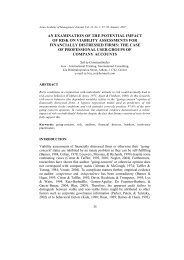

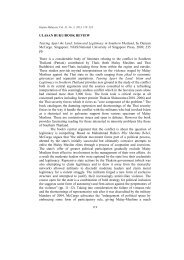
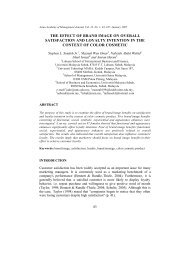
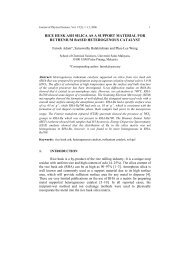
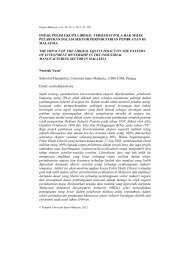
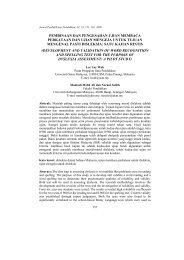
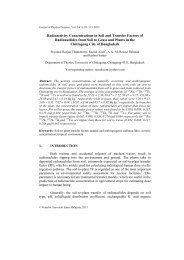
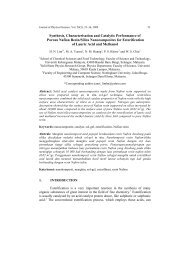

![KTT 111 – Inorganic Chemistry I [Kimia Takorganik I] - USM](https://img.yumpu.com/12405642/1/184x260/ktt-111-inorganic-chemistry-i-kimia-takorganik-i-usm.jpg?quality=85)
